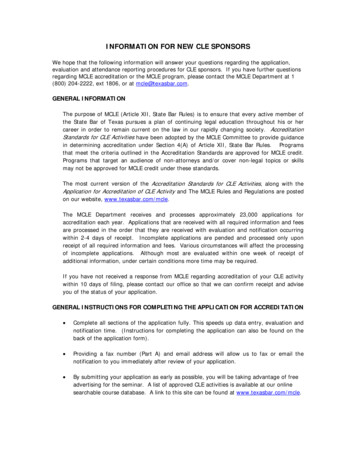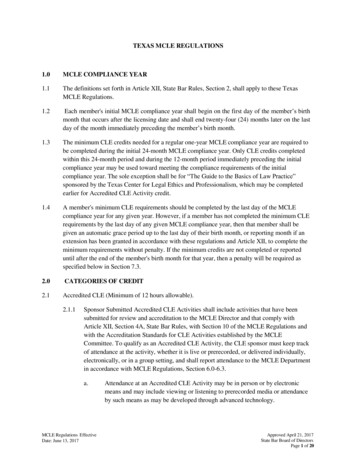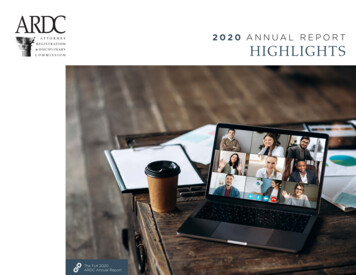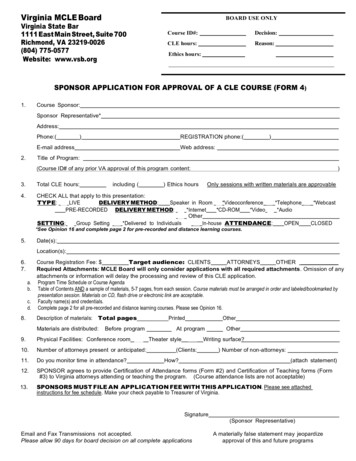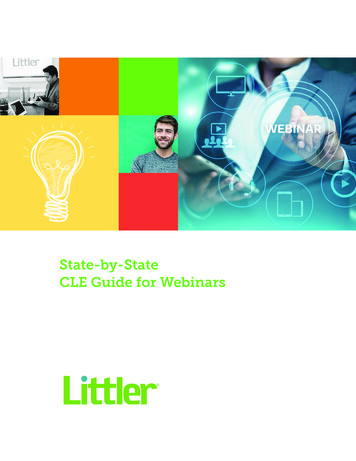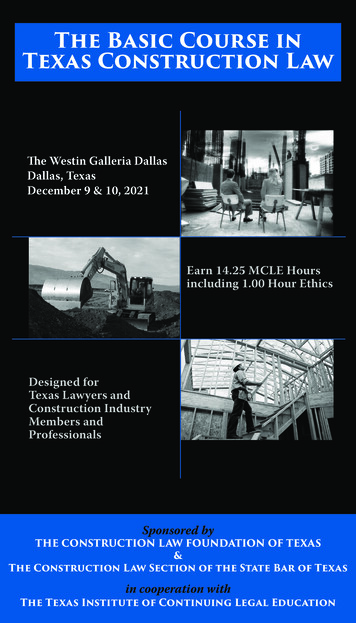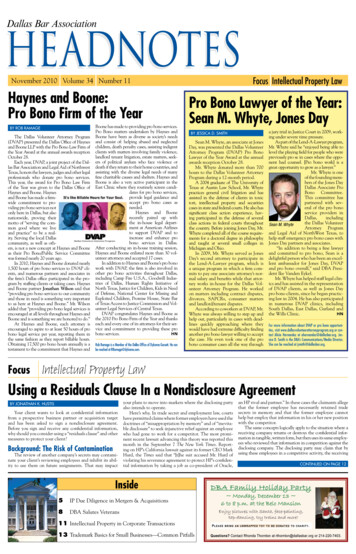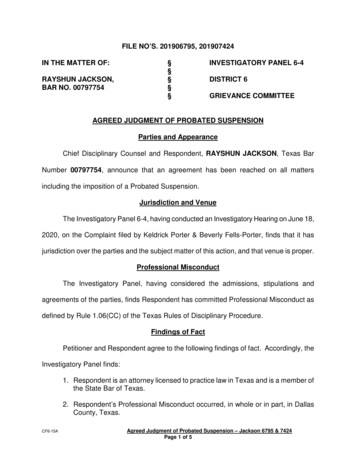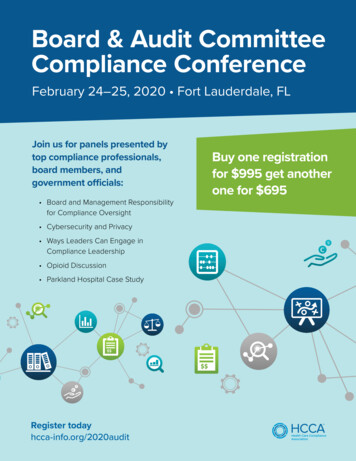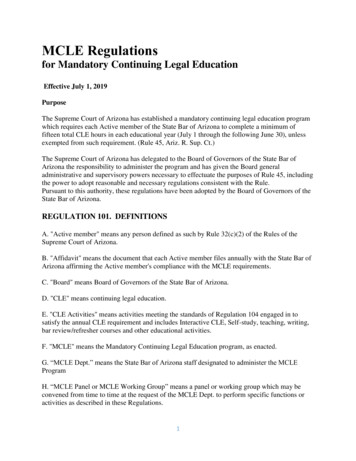
Transcription
MCLE Regulationsfor Mandatory Continuing Legal EducationEffective July 1, 2019PurposeThe Supreme Court of Arizona has established a mandatory continuing legal education programwhich requires each Active member of the State Bar of Arizona to complete a minimum offifteen total CLE hours in each educational year (July 1 through the following June 30), unlessexempted from such requirement. (Rule 45, Ariz. R. Sup. Ct.)The Supreme Court of Arizona has delegated to the Board of Governors of the State Bar ofArizona the responsibility to administer the program and has given the Board generaladministrative and supervisory powers necessary to effectuate the purposes of Rule 45, includingthe power to adopt reasonable and necessary regulations consistent with the Rule.Pursuant to this authority, these regulations have been adopted by the Board of Governors of theState Bar of Arizona.REGULATION 101. DEFINITIONSA. "Active member" means any person defined as such by Rule 32(c)(2) of the Rules of theSupreme Court of Arizona.B. "Affidavit" means the document that each Active member files annually with the State Bar ofArizona affirming the Active member's compliance with the MCLE requirements.C. "Board" means Board of Governors of the State Bar of Arizona.D. "CLE" means continuing legal education.E. "CLE Activities" means activities meeting the standards of Regulation 104 engaged in tosatisfy the annual CLE requirement and includes Interactive CLE, Self-study, teaching, writing,bar review/refresher courses and other educational activities.F. "MCLE" means the Mandatory Continuing Legal Education program, as enacted.G. “MCLE Dept.” means the State Bar of Arizona staff designated to administer the MCLEProgramH. “MCLE Panel or MCLE Working Group” means a panel or working group which may beconvened from time to time at the request of the MCLE Dept. to perform specific functions oractivities as described in these Regulations.1
I. "Proof of Cure" means the submission of records evidencing compliance with Rule 45.J. "Records" means course outlines, written materials, verification of attendance, and otherevidence of a CLE program identifying the course, sponsor, and date and place of presentationand/or publication. Materials that are stored electronically as scans, either on an attorney’s owncomputer system or through the provider’s electronic system, that are accessible during the auditperiod will comply with this requirement.K. "Rule" means Rule 45 of the Rules of the Supreme Court of Arizona.L. “Professional Responsibility (Ethics) Hours” mean those types of continuing legal educationoutlined in Rule 45(a)(2) including ethics. Such CLE programs may address diversity andinclusion in the legal system of all persons regardless of race, ethnicity, religion, national origin,gender, sexual orientation, gender identity, or disabilities, as well as, the elimination of bias.M. "Year" means the educational year from July 1 to June 30. A member’s status as of the end ofany educational year (June 30) determines whether the member has a requirement to meet theMCLE requirements for that educational year.REGULATION 102. MANDATORY CONTINUING LEGAL EDUCATIONADMINISTRATIONMCLE shall be administered by The Board of Governors.The MCLE Dept. has been designated by the Board to administer the day to day operation of theMCLE Program consistent with Rule 45 and the MCLE Regulations.REGULATION 103. DUTIES OF THE MCLE DEPARTMENTA. General AuthorityThe MCLE Dept. shall have general authority to administer the Rule and the MCLE Regulations,subject to the oversight of the Board, and to convene any working groups or panels deemednecessary or advisable.B. Specific DutiesThe MCLE Dept. shall have the following specific duties and responsibilities:1. To distribute information regarding the requirements of these regulations.2. To submit recommendations for revisions of the MCLE Regulations to the Board for approval.3. To prepare the annual MCLE Affidavit4. To conduct compliance audits of Affidavits to determine compliance with the Rule.2
REGULATION 104. STANDARDS AND CALCULATION OF HOURSNote: Specialists' Requirements are at Regulation 109.A. StandardsCLE Activities that are claimed toward the annual requirement shall meet the followingstandards:1. Significant Content. The activities shall have significant intellectual or practical content,have attorneys as the primary audience, and have as the primary objective to increase theparticipant's professional competence as a lawyer.2. Organized Program. The activities shall constitute an organized program of learning, dealwith matters directly related to the practice of law, professional responsibility, professionalism,or ethical obligations of lawyers, follow the agenda and be accompanied by substantive orpractical written materials or exercises.3. Appropriate Setting. The activities shall be conducted in a setting physically suitable to theeducational activity of the program.4. CLE Credit. CLE credit for any individual program may be claimed one time only.Subsequent viewing of the same program or review of the same program materials may not beclaimed in another MCLE educational year.B. CLE Categories and Calculation of Credit Hours1. Carry-forward hours. Hours of CLE credit listed in sections (B)(2) through (B)(9), in excessof that required for the current Year, may be applied to the succeeding Year only.Carry-forward hours are limited to the total required for the succeeding Year, and do not changetheir classification by virtue of being carried forward. All other requirements of the succeedingYear, such as the number of professional responsibility (ethics) credits hours required or thelimitations on other categories of CLE, must be met.2. Interactive CLEa. Definitions of Interactive programs:1. A live CLE program or event attended in person and sponsored by the State Bar or a3rd party organization (i.e. a commercial provider, an association of lawyers, a private lawfirm, a corporate law department, or a department of a federal, state or localgovernmental entity). The program must be attended by no fewer than 5 attorneysincluding presenter(s).2. A web-cast or teleconference, offered in real time, with the ability of the member toask questions of the presenters.3
3. A CLE program which is offered online and in which the member is required torespond to prompts placed at random periods throughout the program or is required tocapture imbedded codes during the program which are later entered online to obtain thecertificate of completion or attendance.b. Calculation of credit hours for Interactive CLE shall be determined by dividing the totalminutes of instruction or participation by 60, and rounding down to the nearest quarter hour.Breaks shall not be included in calculating the credit hours.c. The Active member claiming Interactive CLE credit must have future access to the writtenmaterials or exercises or the electronic equivalent (such as in a personal, firm or provider’swebsite, or public library).3. Teaching HoursCredit may be earned for teaching at a CLE program or event; teaching at an ABA accreditedlaw school; or teaching a law course at any accredited American university, any Americancommunity college, any ABA approved paralegal school or institute, or a CLE activity where theprimary audience is paralegal professionals whether the teaching is in a classroom or online.a. Speakers whose presentations are accompanied by original written materials, prepared,augmented, or updated by the speaker may earn teaching credit, as follows:For the original presentation: First hour of presentation x 6 total credit hoursAdditional hours of presentation x 2 total credit hoursRepeat live presentations hours x 1 total credit hoursb. Speakers, including College of Trial Advocacy educators, whose presentations are notaccompanied by original written materials prepared, augmented, or updated by the speaker mayearn teaching credit as follows:Each hour of presentation x 1 total credit hoursc. Credit hours earned through teaching is limited to a maximum of 10 credit hours each Year.4. Writing HoursCredit may be earned for writing legal material not used in conjunction with a CLE program.Credit cannot be claimed for writing which is part of the regular practice of law or regular scopeof employment.Such material must address an attorney audience, be at least 3,000 words in length, and bepublished by a recognized third-party publisher of legal material or a sponsor.a. For each 3,000 words of original material written, the author(s) may earn 2 credit hours.Multiple authors may share credit for material written.b. Credit hours earned through writing is limited to a maximum of 10 credit hours each Year.4
5. Self-study HoursSelf-study is any course of legal study meeting the standards of Regulation 104, which isundertaken by a member for the member's own benefit. Self-study may include listening toaudio reproductions or viewing video reproductions of programs, but does not include reading.Credit hours earned through Self-study is limited to a maximum of 5 credit hours each Year.Self-study also includes: A computer based or online CLE program that is not interactive (i.e. that does notprovide an opportunity to respond to prompts or questions from the faculty orparticipating member).Service on a legislative committee by a state or federal elected legislative member. Suchservice qualifies a member as a "lawyer/legislator" for the purposes of the Rule and theseregulations. The 5 hours per year maximum for Self-study does not apply to legislativecommittee work for lawyers who are legislators. Note: for audit purposes, membersclaiming hours in this category will be required to provide proof of legislative committeeservice.Service as an arbitrator under Rule 73, Arizona Rules of Civil Procedure. Sucharbitration service qualifies for 2 hours of CLE activity in lieu of financial compensationotherwise available under A.R.S. § 12-133(g) or local rule for service as an arbitrator.Pro bono service to the poor or near poor through an approved legal servicesorganization as defined in Rule 38(e), Ariz. R. Sup. Ct.Calculation: 1 hour of CLE credit for every 5 hours of pro bono service, to a maximumof 5 hours each year.Moot Court hours for participating in a moot court competition at an ABA Approvedlaw school or accredited American university. A maximum of 3 hours of self-study formoot court may be claimed each year. Training sessions for moot court judges whichotherwise meet the standards for CLE as outlined in regulation 104(a) may be claimed asInteractive CLE outside of Self-study.Participation as a mentor in the State Bar of Arizona Mentoring Program qualifies asvoluntary pro bono public service under Ethical Rule 6.1. Mentors may claim amaximum of 2 hours of CLE each year; all 2 hours may be claimed as professionalresponsibility (ethics).Participating as a mentee in the State Bar of Arizona Mentoring Program. Menteesmay claim a maximum of 2 hours of CLE each year. Mentee hours do not qualify underEthical Rule 6.1.a. Self-study hours shall be equal to the actual hours of the program watched or the actual timespent in Self-study, whichever is less.b. A member may not receive credit for both attendance at a CLE program and Self-study ofcourse materials from that program.c. Written materials (or the electronic equivalent) must be in the possession of the memberviewing the video reproduction or listening to the audio reproduction of a live CLE program at5
the time of such viewing/listening. The member claiming Self-study credit must have futureaccess to the written material (such as in a personal, firm, provider’s website or public library).d. Verification of Self-study in the event of audit includes the purchase receipt or rentalagreement in the member’s name; notes made while viewing/listening; and file notes establishingthe date of Self-study, name of program, and sponsor of the program.If a provider does not allow the sharing of Self-study programs with a 3rd party, then only themember whose name appears on the purchase or rental agreement may claim credits for thatprogram.e. Verification of non-compensated arbitration in the event of audit will be a copy of theappointment as arbitrator and a copy of the decision.f. Verification of pro bono service hours in the event of audit will be a document produced by theattorney or legal services organization (LSO) to include the name of the LSO, date(s) of service,the number of service hours provided, the number of self-study hours being claimed, signed by arepresentative of the LSO affirming the attorney’s service.6. Law School CoursesMembers may earn CLE credit by taking law school courses taught within the curriculum of anABA-accredited law school. Success on an examination is not required for credit, and the coursemay be taken on an audit basis.a. For each fifty (50) minutes of instruction, one-half hour (1/2 hr) of CLE credit may be earned.b. Credit hours earned through law school courses is limited to a maximum of 10 credit hourseach Year. No credit will be given for law school courses attended prior to becoming an Activemember.7. Bar Review/Refresher CourseActive members attending courses designed to review or refresh recent law school graduates orother attorneys in preparation for any bar examination may earn CLE credit for such courses.Credit hours earned through bar review/refresher courses is limited to a maximum of 5 credithours each Year.8. Service on the Criminal Jury Instructions (CRJI) Committee of the State Bar of ArizonaService on this committee may be claimed for CLE credit. For members who attend andparticipate in the meetings and review but do not make any presentations, the committee timemay be claimed as 1 credit hour per hour of attendance in the category of “Interactive” hours.Members who research, review and present their recommendations may claim “Teaching” hours.See B(3) of these regulations for calculation and limitations on teaching hours.9. Other Educational ActivitiesMembers participating in educational activities not defined by the above categories may submita request for consideration of such activity to the MCLE Dept. An MCLE panel will be6
convened to review the request and determine on a case by case basis if CLE credit may beclaimed for the activity.REGULATION 105. AFFIDAVITThe MCLE Dept. annually shall prepare an affidavit to be filed online by the member, uponwhich compliance with the Rule and MCLE Regulations shall be demonstrated.REGULATION 106. EXEMPTION/WAIVER OF MCLE REQUIREMENTSExemptions/waivers of any of the MCLE requirements may be granted upon an application andshowing of undue hardship.Undue hardship exists when a member is unable to complete the MCLE requirements because ofa medical or financial hardship beyond their control or are active military. Examples of suchhardships include: Financial hardship – due to unemployment; time out from practice for family or healthreasons; low income based upon extraordinary practice or business losses.Medical hardship - serious health issue(s) resulting in extraordinary medical expenses orinability to workActive Military - A State Bar member, serving on active duty in the United States Militaryin an assignment outside the United States for a cumulative period of at least three monthsduring the educational year covered by a MCLE filing, is deemed to have a personalhardship warranting an automatic waiver of MCLE requirements.The following circumstances are NOT considered an undue hardship: 1) failure of the member tocalendar the filing deadline; 2) failure of the member to promptly notify the State Bar of achange in the member’s contact information; 3) assertion of the member that he/she did notreceive reminder emails; or 4) the member’s delegation of the responsibility to file the affidavitto another person.To request an exemption/waiver of the MCLE requirements, members must submit anapplication on the form provided by the MCLE Dept. The Chief Executive Officer/ExecutiveDirector of the State Bar has the authority to grant exemptions/waivers, pursuant to the Rule,All denials of requests shall be reviewed by the Board.REGULATION 107 AUDITSA. Audits of ComplianceAnnually the MCLE Dept., under the direction of the Board, shall randomly select a designatednumber of Affidavits to audit for compliance.1. Initial notification of audit will be completed no later than March 15 followingsubmission of the Affidavit.7
2. Notification of selection for audit shall be mailed to the member at the member’s lastaddress of record on file with the State Bar.3. Each Active member whose Affidavit is selected shall supply such Records supporting theAffidavit to the MCLE Dept. as requested.4. Following successful completion of a member’s affidavit audit, a notification ofcompliance shall be mailed to the member at the member’s last address of record on filewith the State Bar as soon as practicable.B. Presumption of ComplianceAffidavits reflecting the completion of a State Bar CLE Department sponsored program or thoseapproved through the CLE Department shall be presumed to meet the Standards and Calculationrequirements of Regulation 104, thus avoiding the need for the member to separately submitrecords supporting those credit hours.C. Failure to Provide RecordsIf the member fails to provide the requested audit Records within 30 days after the MCLE Dept.mails its request, the MCLE Dept. may take appropriate action, which may include commencingaction for summary suspension pursuant to Rules 45 and 62.D. Disallowance of Credit HoursIf, as a result of an audit of the Affidavit or Records, the MCLE Dept. disallows some or all ofthe credit hours for failure to conform to the standards set forth in Regulation 104, and theremaining CLE hours are less than the number required for compliance, the member will bedeemed not to have complied the MCLE requirements.A notification of disallowance shall be mailed to the member at the member’s last address ofrecord on file with the State Bar as soon as practicable. The member shall have 45 days from themailing date of notification of disallowance to complete the MCLE requirements, and uponcompletion shall file an amended MCLE affidavit demonstrating the disallowance has beencured. The member will be subject to the delinquent compliance and/or delinquent filing fees asprovided in Rule 45(d).If the MCLE Dept. does not receive an amended affidavit verifying the cure of the disallowancewithin 45 days of the mailing date of notification of disallowance, it will notify the member ofthe member's right to petition for a hearing. No CLE Activity designated to satisfy disallowedcredit hours may be used to satisfy current MCLE requirements.E. Hearing on Failure to Cure1. If a hearing is requested, it shall be held within 30 days by an MCLE Panel convened for suchpurpose. Notice of time and place of the hearing shall be given 10 days in advance. Thepetitioner may be represented by counsel. Witnesses shall be sworn and, if requested by thepetitioner or the MCLE Panel, a complete electronic record of a transcript shall be made of allproceedings and testimony with the expense, if any, being borne by the requesting party. TheMCLE Panel shall have the authority to rule on all motions, objections, and other matterspresented in connection with the hearing.8
The MCLE Panel shall, in every case, file with the Board a report containing its findings of factand a determination whether the petitioner has complied with the Rule, and upon a finding offailure to cure, a determination whether there was reasonable cause for failure to cure. The reportshall be filed, and a copy served upon the petitioner within 30 days after conclusion of thehearing.The findings and determinations in the report shall be final, unless within 10 days from the dateof service the petitioner files a written objection with the Board.2. If the MCLE Panel determines that there was reasonable cause for failure to cure, thepetitioner shall be allowed 15 days to file a specific plan for correcting the failure to cure withinthe next 60 days following submission of the plan. The plan shall be deemed accepted by theMCLE Panel unless within 15 days after receipt, the MCLE Panel notifies the petitioner.Completion of the plan shall be reported by affidavit to the MCLE Panel not later than 15 daysfollowing the 45-day period. If the petitioner fails to complete and certify completion within the45-day period, the MCLE Panel shall proceed as though there was not reasonable cause forfailure to cure.3. If a request for hearing is not received within 15 days, the MCLE Dept. may take appropriateaction, which may include commencing action for summary suspension pursuant to Rules 45 and62.F. Appeal to BoardAny objection to an MCLE Panel report shall be considered by the Board at its next availableregular meeting. To perfect such objection, the Active member shall file a Memorandum inSupport Of review within 15 days of the filing of the notice of objection. Upon the filing of anysuch notice of objection with the MCLE Dept., the MCLE Dept. shall prepare a report of thehearing, a transcript of the hearing (if an electronic record of the hearing was requested) andcopies of all orders, findings, and other documents pertinent to the proceedings, which shall becertified by the MCLE Panel. The Board may, but shall not be obligated to, permit the memberor the member's counsel to appear in person before it. The Board may affirm, reverse, or modifythe ruling of the MCLE Panel, as it deems appropriate. The decision of the Board shall bereduced to writing, and a copy thereof shall be mailed to the member. The decision of the Boardshall be final. If appropriate, the Board shall direct commencement of action for summarysuspension pursuant to Rules 45 and 62.REGULATION 108. AMENDMENTSThese regulations may be amended, deleted, or supplemented by action of the Board.REGULATION 109. CERTIFIED SPECIALISTSAs long as the CLE requirement established by the Board of Legal Specialization for a certifiedspecialist is at least consistent with the minimum requirement of section (a) of the Rule, acertified specialist may meet the requirement of section (a) of the Rule by meeting the MCLErequirements of the Board of Legal Specialization.9
SPECIALIST MCLE REQUIREMENTS(Reference: Board of Legal Specialization RegulationsSection VIII. Annual Requirements)1. Annual CLE.a. Each specialist must complete 15 or more hours per year at one or more CLE activities whichmeet the standards stated in Section VII B.2. This includes a substantive requirement of 12hours and a professional responsibility requirement of three hours.Note: Members who are certified as specialists in more than 1 area of specialization are requiredto meet the substantive CLE requirement in each area of specialization.1. Substantive Requirement: The 12 hour substantive requirement refers to CLEActivities in the specialist's area of specialization.2. Professional Responsibility Requirement: The three hour professional responsibilityrequirement refers to CLE Activities on topics of professional responsibility, as definedin Rule 45, Ariz. R. Sup. Ct. (MCLE Rule).3. Categories of CLE Activities: Within the overall 15 hour CLE requirement, 12 ofwhich must be substantive and three of which must be professional responsibility(ethics), the following minimum and maximums apply:a. At least five hours must be earned by attendance at Interactive CLE.b. No more than 7.5 hours may be earned through a combination of teachingand/or writing CLE. Written legal material must be in the area of specialization.c. Credit, at a maximum of five (5) hours, may be earned through Self-study.b. Carry Forward Hours: If a specialist has completed more than the required 12 (twelve) hoursin their area of specialization, up to 5 (five) hours in that area of specialization may be carriedforward to the next educational year. Additionally, up to 3 (three) hours in professionalresponsibility may be carried forward to the next educational year. The annual CLE requirementmust be met for each year a specialist is certified, including the year of certification.2. StandardsCLE Activities that are claimed toward the annual requirement shall meet the followingstandards:a. Significant Content. The activities shall have significant intellectual and/or practicalcontent and the primary objective shall be to increase the attendee's professional ability as aspecialist. The content of activities may include a broad or narrow range of subjects dealingwith the particular specialty field.b. Organized Program. The activities shall be an organized program of learning, deal withmatters directly related to the specialization field or professional responsibility, follow theagenda, and accompanied by the written materials or exercises. The level of instruction of10
CLE Activities in the area of the specialization field shall be directed toward thedevelopment of advanced skills in the area of specialization.c. Appropriate Setting. The activities shall be conducted in a setting physically suitable to theeducational activity of the program.d. Instructors. The instructors of CLE Activities shall be experts in the field in which they areteaching. The instructors' qualifications and appropriate background information shall be setforth in the activity's brochure or written materials.e. Records. Course outlines, written materials or the electronic equivalent, verification ofattendance, and other evidence of a CLE Activity identifying the course, sponsor and dateand place of presentation and/or publication must be retained by the specialist forrecertification and any MCLE audit.3. Calculation of Credit Hoursa. Calculation of credit hours shall be determined by dividing the total minutes ofinstruction by 60, and rounding down to the nearest quarter hour. Breaks shall not beincluded as part of instructional time. For CLE Activities in the specialization field, if theactivity contains other subject matter not directly related to the specialty, credit shall beallowed for the time spent in the specialty area.b. Teaching Hours. Credit may be earned for teaching at a CLE Activity or at an ABAaccredited law school, or teaching a law course at any accredited American university or anyAmerican community college.Teaching may be on-line or in a classroom, so long as the instruction meets the standards ofSection VIII.B.2, except that the instruction may be at a basic level.Calculation of Teaching Hours.Speakers whose presentations are accompanied by written materials prepared,augmented, or updated by the speaker may earn teaching credit, as follows:For the original presentation:First hour of presentation x 6 total credit hoursAdditional hours of presentation x 2 total credit hoursRepeat live presentation hours x 1 total credit hoursSpeakers, including College of Trial Advocacy educators, whose presentations arenot accompanied by written materials prepared, augmented, or updated bythe speaker may earn teaching credit as follows:Each hour of presentation x 1 total credit hoursCredit hours earned through a combination of teaching and/or writing CLE may bereported to satisfy a maximum of 7.5 credit hours each year.11
c. Writing Hours. Credit may be earned for writing legal material in the area of specializationnot used in conjunction with a CLE Activity. Such material must address an attorneyaudience, be at least 3,000 words in length, and be published by a recognized third-partypublisher of legal material or a sponsor.i.ii.iii.For each 3,000 words of original material written, the author(s) may earn two credithours: Multiple authors may share credit for material written.The first two hours may be basic in nature, but beyond that must be at an advancedlevel.Credit hours earned through a combination of teaching and/or writing CLE may bereported to satisfy a maximum of 7.5 credit hours each year.d. Self Study. Professional responsibility credit may be earned for participation in self-studyactivities. “Self-study” may include listening to or viewing course materials but does notinclude reading.i.ii.iii.iv.Specialists may claim up to 5 hours of CLE in their area of specialization via selfstudy formats. Self-study formats are CDs, DVDs, and non-interactive videos orwebcasts, or non-interactive online programming. The self-study programs must meetthe higher standards for specialists with respect to intellectual and/or practical contentand be primarily focused on the area of specialization. Credit hours earned by selfstudy of course materials shall be equal to the hours of presentation of the seminar onwhich the materials are based, or the actual time spent in self-study, whichever is less.A specialist may not receive credit for both attendance at a seminar and self-study ofcourse materials from that seminar.Credit hours earned through self-study is limited to a maximum of 5 hours of CLE intheir area of specialization via self-study formats.Specialists may not receive self-study credit for service as a non-compensatedarbitrator.12
CLE credit for any individual program may be claimed one time only. Subsequent viewing of the same program or review of the same program materials may not be claimed in another MCLE educational year. B. CLE Categories and Calculation of Credit Hours 1. Carry-forward hours. Hours of CLE credit listed in sections (B)(2) through (B)(9), in excess
